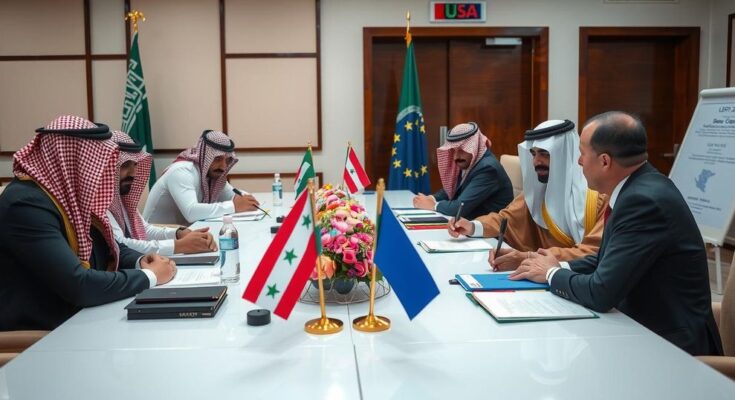Arab and EU diplomats convened in Riyadh to discuss support for a Syria that is undergoing a leadership change after Bashar al-Assad’s ousting. The talks include a focus on sanctions relief and a commitment to establishing an inclusive government. Saudi Arabia aims to enhance its influence in Syria while addressing humanitarian needs and navigating geopolitical dynamics.
On Sunday, diplomats from the Middle East and Europe convened in Riyadh, Saudi Arabia, to engage in discussions concerning the future of Syria following the recent ousting of Bashar al-Assad. The gathering was marked by two distinct sessions, first comprising Arab officials and subsequently expanding to include representatives from Turkey, France, the European Union, and the United Nations. The new Syrian leadership, represented by Ahmed al-Sharaa, is advocating for the lifting of international sanctions that have crippled the country since the onset of the civil war in 2011.
The lingering conflict has resulted in severe humanitarian crises, displacing millions and killing over half a million individuals. In response, the European Union indicated that it might consider easing sanctions if the new government in Syria demonstrates a commitment to form an inclusive and representative administration that safeguards the rights of minorities. Saudi Arabia, which has historically opposed Assad, is currently playing a leading role in regional efforts to stabilize Syria, as evidenced by its recent humanitarian contributions of food, shelter, and medical aid.
Furthermore, the diplomatic endeavor highlights a strategic shift for Riyadh, as it seeks to cultivate influence in a country where other regional players, particularly Turkey and Qatar, have already established a foothold. Analysts emphasize that while there is cautious optimism regarding the new Syrian administration’s potential to control extremist elements, the question remains as to how much support Saudi Arabia can feasibly provide amid continuing sanctions. The summit aims to fortify a collaborative framework for Syria’s recovery, aligning with prior discussions held last month in Jordan regarding a Syrian-led transition to a more inclusive government structure.
The article focuses on the ongoing efforts by Arab and European diplomats to address the situation in Syria, particularly in light of the recent transition in leadership following the departure of Bashar al-Assad. It reflects efforts from Saudi Arabia to strengthen its influence within Syria, a country that has faced immense turmoil due to over a decade of civil war. The context involves recent humanitarian efforts and the geopolitical dynamics concerning sanctions imposed on the prior administration, as well as the necessity for a cohesive international strategy for Syria’s recovery.
In conclusion, the gathering of diplomats in Riyadh signifies a pivotal moment in the regional approach towards Syria’s reconstruction and stabilization following the upheaval of the Assad regime. As Saudi Arabia emerges as a key player, the effectiveness of its strategies, particularly in coordinating international support and navigating the complexities of sanctions, will be crucial in shaping Syria’s future. The discussions held may pave the way for a more collaborative approach to ensure a peaceful and stable Syrian landscape.
Original Source: www.france24.com




